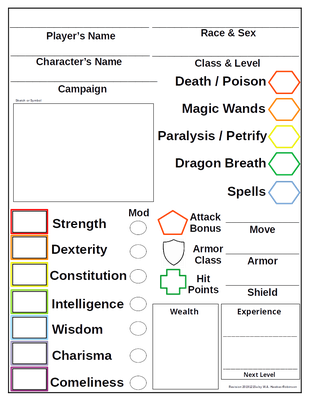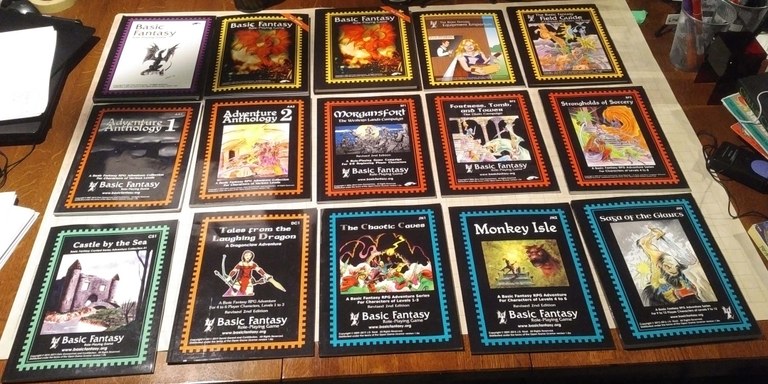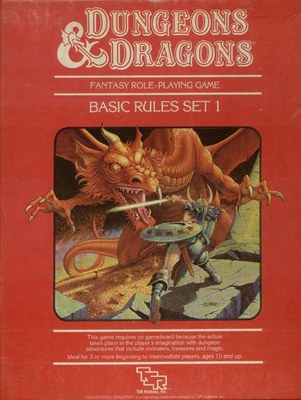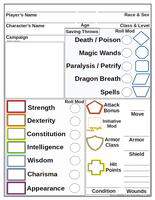Improving Access to Tabletop Role-Playing Games by Overcoming High Barriers to Introductory Play
"RPG developers need to snap out of their bubble and quit relying on the mentor model as the only mode of entry into role-playing games". Anyone following he nearly dozen RPG Research broadcasts per week has probably heard some variant of this statement from the 501(c)3's founder, Hawke Robinson.
The Mentor Model
While mentoring is wonderful in many areas, solely relying on this approach for RPG adoption has hamstrung growth for decades. The Mentor model is great long term and for those wanting more advanced skill development, but it is an unnecessary barrier to entry for introduction and doesn't scale, which has been a bottleneck to RPG adoption for decades.
We are total advocates for advanced training: https://www.rpgresearch.com/rpg-training-for-volunteers/ but most people, at least initially, need something more accessible for getting started, potentially all on their own, then later bring in family, friends, strangers, etc.
Imagine a youth or adult receiving their first RPG starter set on Christmas day. The current model is problematic for learning their first system with no prior experience, and getting to play their first game right there and then. The addressed approach we suggest solves this. Then after that initial learning they can layer in much more advanced skills with others. We're just talking about the initial introductory barriers.
The Mass Learning Model
While folks at higher levels of cognitive functioning can handle the mass learning model reasonably well, study after study proves this is an exceptionally inefficient method for learning complex systems. A more graduated approach, as listed in the Neuroscience of Learning section below covers, is proven to b much more effective in both the short and long term.
Neuroscience of Learning Complex Systems
Regularly pointing out that so far the ONLY RPG we have been able to find that seems to intuitively understand what the cognitive neurosciences of learning show are the most effective methods for learning complex topics, with the 1983 Frank Mentzer red box Basic D&D system (BECMI).
Key concepts that designers & publishers should take into account include:
- Avoid mass learning
- Utilize differential learning
- Maximize elaboration, distinction, narrative, & self-referencing.
- Make use of the testing effects, but be careful about the limitations of memory chunking and working within the parameters of 7+/-2 or 5+/-2, by keeping in mind the benefits of existing knowledge techniques.
- Include opportunities for deep processing, associative knowledge, desirable difficulties.
- Especially use a variety of distinctive cues, encoding specificity, rich multi-sensory descriptions, and exploration of opportunities.
Don't Need to Dumb Down Games, Instead Raise Humanity Up
Unfortunately in the RPG publishing industry the trend, instead of following these neuroscience learning principles, has been to unnecessarily dumb down RPG offerings, rather than raise up the players while lowering initial barriers to entry. Our research shows that these efforts at simplifying the games have also reduces some of the cognitive benefits earlier studies found from participation in RPGs, especially in math, vocabulary, and reading comprehension. This is exactly the wrong approach.
The BECMI Basic D&D player's manual provides step-by-step learning, by yourself, through 2 solo adventures. And then takes an important step further in the BECMI Basic D&D Dungeon Masters manual walking the brand new GM through the process of being a DM for the first time with 1 or more players. They aren't perfect, but they are hands-down the single best introductions to role-playing gaming, that follows neuroscience proven learning principles, better than any other publication we have found anywhere to date.
This makes the wonderful benefits of RPGs available to participants at younger developmental ages, and helps improve accessibility for various populations with special considerations.
The only game in many years to do the first part well is the new 7th edition Call of Cthulhu Starter Box Set by Chaosium. As was shown in a stream earlier this year with a play through, it does an excellent job introducing a player gradually to how to play the CoC rules. But then it falls flat like so many others when handed off to a first-time GM to "read through all the rules" and "read through the entire adventure" before trying to run a game as a first time GM.
Why Mess With The "Time Tested Method"?
Quotes:
"There is a thing called the starter set. It's a great thing for a person who has never played."
"Sorry, I get what you are trying to do, but I also like the time tested method."
"Even without a mentor, all of us from the 70s and 80s managed to learn how to play and make great games."
I'm an old timer gamer, began RPGing in '77 so I understand the sentiment and thought the same thing about the mentor model, and the self-taught approach with the mass learning approach for years.
This worked great for me, but as someone around the 99.9 percentile cognitive functioning level (as many from the old school days are), that isn't a realistic measure for accessibility to the general public alas.
We have tested many, many, starter kits, and unfortunately they keep falling short for the majority of the population.
We all get into our own self/community/cultural bubbles and think how we've always done it is the best way, it's human nature.
However, after decades of research work, that we and many others have performed, plus our running school programs (since '85), community, and therapeutic programs (since '04), the evidence is overwhelming that this is an issue that needs to be addressed.
And then of course for anyone with below average cognitive functioning due to IQ (lower 30th percentile (<93 IQ)) or various disabilities or neurodifferences, there is even more reason to take this approach following what science strongly supports as the most effect method for learning complex systems.
There are plenty of people the old model works well for, and we're not talking about the old way going away in anyway, nor the self-taught approach. If it works for you then, great, go for it!
This is about the fact that, without having to dumb down the system, far more people will benefit from the helpful effects of RPGs if variations based roughly on the 1983 Frank Mentzer BECMI introductory model is utilized more ubiquitously throughout the RPG industry for bringing in brand new players outside of the usual social/cultural circles around the world.
Chaosium's CoC 7th edition was on the right track for players, alas it didn't follow through on the GM side, but it was nice to see something more recent starting to get on the right track for absolute beginners.
Variety of Games
Here is a list of game offering tiers (always a work in progress): https://w3.rpgresearch.com/staff/new-volunteers/volunteer-training/game-offerings
While we have been partnering with more and more wonderful individuals and organization also interested in improving accessibility to gaming by providing guidance to game developers and publishers, even after 15+ years the adoption rate by the companies has been frustratingly slow, so we're trying to find a means to address these issues NOW, rather than years from now.
Partnerships
Wonderful partners in our various endeavors include:
- The Dots RPG Project
- Spark Central
- Muscular Dystrophy Association
- Neural Matrix Entertainment
- Zombie Orpheus Entertainment
- Eastern Washington Center for Deaf & Hard of Hearing / Nexus
- Lilac Center for the Blind / Nexus
- Northeast Youth Center
- Eastern Washington University TR Professor Emily Messina, PhD, CTRS.
- And many others
An Example Using BFRPG That Can Be Applied To Others
A more accessible Basic Fantasy RPG Character sheet draft revision (still under development) by Hawke Robinson with RPG Research.

This issue of high barriers to TRPG entry has been going on frustratingly for decades , due to a weird bubble and group think effect of the RPG community that keeps overly front-end loading learning despite all the evidence how inefficient an approach this is to bring in new gamers.

Issues Addressed with BFRPG
Now, since we've been finding that Basic Fantasy (BFRPG) from www.basicfantasy.org solves a lot of other accessibility issue for barriers to entry in RPG, we see a means for finally addressing all these issues quickly:
- Low economic resources
- Reading disabilities such as dyslexia, with simple clean fonts
- Simpler, cleaner rules
- Not putting watermarks on the pages behind the text
- Not putting artwork or graphics behind the text
- Free to download PDFs and can use some in text reader for visually impaired.
- Free to download the original editable .odt (Libreoffice Writer) files, so can change font to oversize for impaired vision, or customize in any other way desire.
- Inexpensive to purchase physical copies (rulebook just $6, supplements only around $3-4 dollars each).
Since we are seeing good result from using BFRPG instead of D&D 5e as an introductory RPG in our community programs and training workshops, we're now working on helping that very active community with some contributions of our own.
BFRPG fixes some of the -isms of the old school (OD&D & BECMI) systems such as THAC0 and attribute checks inversion of rolls, and follows the more consistent D&D 3.x/4/5 version for action resolution, making BFRPG a better introductory gateway to D&D than BECMI.

BFRPG also fixes our rule about being able to get the rulebooks and supplements in physical printed format not just electronic format, with their low-cost (not for profit) print on demand options. The BECMI Player & DM manual are only available in PDF through drivethrurpg with no print on demand option. The only PoD available is the Rules Cyclopedia which does not include the introductory adventures for learning, but does solve the reference book problem with the BECMI line.
BFRPG fixes the barrier to entry for low income by being freely available in electronic format, and the printed format being very affordable, at just $6 USD for the softcover rule book, readily available on Amazon, with supplements averaging only $3-4 each, an entire set of 12 books with multiple copies of the rule book for your friends is only about $80!
We have now removed BECMI from our training and game offerings and replaced it with BFRPG.
We have moved D&D 5e from a Tier 1 game to a Tier 2 game, and now train all of our game master trainees using BFRPG before D&D. This has proven to be very effective in helping with learning and behavior modification for many populations.
Further Accessibility Enhancements
There is a long list of possibilities, but some that are already in the works regarding accessibility and barriers to entry for new role-playing gamers are:
- A simple accessibility enhanced character sheet (now play testing)
- 3 Introductory solo adventures to walk someone through, on their own, how to play the game
- 2 introductory DM Adventures that step-by-step walk a new GM through running their first game, without having to front-end load, able to just open the page and in a few minutes be ready to run the game
Future Involvement
We recently hit volunteer number #104 at RPG Research, with our game master, player, software developer, artists, transcription, and research volunteers spanning 5 continents around the world! We'll be doing all we can to help support the vibrant BFRPG community to help them take their great ideas to the next level to maximize the accessibility of role-playing games for everyone around the world!
We're hoping to address some other issues with our own customization of BFRPG to further enhance its efficacy, such as:
- Introductory solo adventures for players
- Introductory adventures for brand new GM that can be played as you read rather than huge front-end loading.
- Visual accessibility enhancements version (larger and Sans fonts)
- Separate players manual from GM manual
- Braille edition (hopefully Dots RPG can help us here)
- Maximized features for text readers for visually impaired/blind users
This is just the beginning of a series of new content you'll see coming from RPG Research, and the other partnership organizations we're growing our relationships with round the world, in our efforts to use role-playing games to help improve lives around the world. Stay tuned!
Please consider donating to the 501(c)3 non-profit research and human services charitable organization RPG Research here: https://www.rpgresearch.com/donate/
Document Actions

